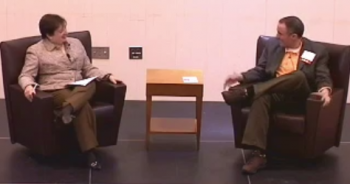Michael Kinsley, Opinion, and the Evolution of Media
Innovating at the Editorial Board
 At the Los Angeles Times, Kinsley’s turbulent tenure is best remembered for two things – it’s willingness to experiment with one of the oldest formats in publishing, and a brutal debate over the diversity of the editorial page.
At the Los Angeles Times, Kinsley’s turbulent tenure is best remembered for two things – it’s willingness to experiment with one of the oldest formats in publishing, and a brutal debate over the diversity of the editorial page.
His efforts to shake up the editorial page started rockily. Perhaps while getting re-acclimated to older technology, Kinsley (or a staff member) inadvertantly left a PowerPoint of proposed changes to the editorial board on a photocopier. The changes included releasing a third of the editorial staff and rethinking how the editorial department functioned; Kinsley’s staff was not pleased by the accidental discovery.
The most memorable innovation Kinsley championed was the creation of a “wikitorial”, inviting readers to make responsible changes to a piece about the Iraq War. They did, except for the “responsible” part. What began as an effort to democratize public opinion ended with vulgar images – a microcosm of many other Internet-based innovations. In the year that Wikipedia emerged as the most popular reference site on the Internet, applying the wiki format to an editorial was a bold gamble, if an unsuccessful one. Moreover, it was a pure example of seeking persuasive argument with which to persuade the majority. The stumbling block, of course, was that the minority that sought to comment was not the minority passionate about resolving the debate.
In March of 2005, Kinsley faced a larger challenge. Susan Estrich, a USC professor, writer and commentator publicly noted the stark gender imbalance on the Times’ editorial page in an exchange that quickly became contentious. A former classmate of Kinsley’s at Harvard, Estrich submitted a letter to the Times signed by a number of prominent women. When Kinsley refused to run the letter, which he indicated ran counter to policy prohibiting multiple signatories, Estrich declined his offer to run a solo piece. She criticized Kinsley repeatedly over email, copying other members of the media. In one message she wrote that, “people are beginning to think that your [Parkinson’s] may have affected your brain, your judgment and your ability to do this job.” (Not the best way, incidentally, to win sympathy for your side of a debate; and in any case, any wiki-user would tag that one with “citation needed.”)
Shortly thereafter, Kinsley left the Times – unwillingly, according to both sides. In an email to staff at the time of his departure, Kinsley wrote that “[Publisher] Jeff [Johnson] isn’t merely uninterested in any future contribution I might make, but actively wants me gone.” Employees also seek FUA; Kinsley wasn’t in Los Angeles long enough to earn it. Meanwhile, a website for Estrich’s campaign, LATimesBias.org, remains live, still seeking to persuade.
The Future of Newspapers
Following brain surgery (his essay announcing the procedure, intended to reduce the symptoms of Parkinson’s, is a classic), Kinsley began contributing regularly to Time. His initial piece, published only two months out of recovery, considered the future of the newspaper. With a bit of schadenfreude, Kinsley noted the precarious position of his alma mater in Los Angeles, but raised otherwise solid points about the transition of news companies from print infrastructure to the web.
[A]re we doomed to get our news from some acned 12-year-old in his parents’ basement recycling rumors from the Internet echo chamber? Not necessarily. The fact that people won’t pay for news on the Internet isn’t as devastating for the old medium as it seems. People don’t pay for their news in traditional newspapers: they pay for the paper, which typically costs the company more than it charges for the finished product. So in theory, giving away the news without the paper looks like a good deal for newspapers, if they can keep the advertising.
Once you’ve rented an apartment online, you know that traditional newspaper classifieds, with their tiny type, have no future. But only slow-footedness has kept newspapers from dominating online classifieds. Technology can be bought, but the brand value of a local newspaper cannot (unless you buy the paper). Maybe it’s too late, but if newspapers have missed this boat, it’s their own fault.
Michael Kinsley, unlike nearly every other pundit debating this issue, transitioned from the Internet to a newspaper. Despite the hackneyed jab at bloggers, he understood that the problem with the Times was in the printing plant, not the newsroom, and that the salvation was in the “if” clause with which he closed the first paragraph above.
 Kinsley continued to contribute to Time regularly until early last year. In a scathing review of the the revamped Newsweek (“Backward Runs Newsweek”), Kinsley led bluntly. “Having recently been dumped by Time, I naturally had great hopes for this week’s much-anticipated makeover of Newsweek…. But judging from its first issue, the new Newsweek is not going to be the instrument of my revenge, alas.” The review was seen as sour grapes – but not as being incorrect. (That revamp, of course, failed to achieve its goal.)
Kinsley continued to contribute to Time regularly until early last year. In a scathing review of the the revamped Newsweek (“Backward Runs Newsweek”), Kinsley led bluntly. “Having recently been dumped by Time, I naturally had great hopes for this week’s much-anticipated makeover of Newsweek…. But judging from its first issue, the new Newsweek is not going to be the instrument of my revenge, alas.” The review was seen as sour grapes – but not as being incorrect. (That revamp, of course, failed to achieve its goal.)
Last fall, Kinsley agreed to launch what was first intended to be a business website for The Atlantic, but which transmogrified into a series of columns grouped under the heading Editor-At-Large. He’s quickly made a splash – among other things, challenging perceived Tea Party selfishness which prompted a sputtering response from the Breitbartists.
The timing of this new project was appropriate: this March, the American Society of Magazine Editors elected Kinsley to the Magazine Editor’s Hall of Fame. The New Yorker‘s Hendrik Hertzberg – as good at praising those he admires as he is at gutting those he dislikes – penned a simple tribute that reflects his affection and that of his peers. An excerpt:
[I]f there really were a Magazine Editors’ Hall of Fame, or better still a Magazine Editors’ Hall of Talent and Kindness, with porticos and columns and marble busts, Mike Kinsley would deserve a big niche.
>>>NEXT: The Twilight of Objectivity
This is an opinion piece. The views expressed in this article are those of just the author.
New: The Mediaite One-Sheet "Newsletter of Newsletters"
Your daily summary and analysis of what the many, many media newsletters are saying and reporting. Subscribe now!






Comments
↓ Scroll down for comments ↓